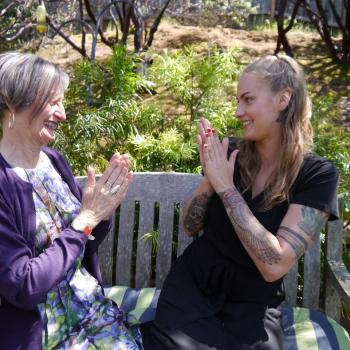In, Neuroscience Psychology and Religion, authors Malcom Jeeves and Warren S. Brown argue that an adequate conception of the image of God in human beings must include our capacity for relationship, both with God and others. In this light, it seems that any refusal to remain in committed relationship with a loved one who suffers from Alzheimer's is simultaneously a disregarding of God's creation and of the significance of their humanity. Perhaps we can actually damage the imago Dei in others by our refusal to relate to them as persons?
The notion that Alzhiemer's is a "kind of death" is problematic on so many levels, not the least of which is the reality that people with Alzheimer's, even those who have entered its latest stages, still experience a powerful, vibrant life, filled with struggle, joy and profound contact with God and others. In fact, they can teach those of us who know them—their caregivers, family and friends—more about life than we can learn in the common world of rationality. The authors Deeper Into the Soul, the authors cite Naomi Feil, a respected leader in Dementia caregiving, saying: "I find that these people are not victims. They are often wiser than those who call them victims" (p. 68).
In one of his religious discourses, Søren Kierkegaard wrote "to need God is a human being's highest perfection." When life strips away our facades of rationality, coherence, togetherness, intelligence and even memory, persons might find themselves in the most profound relation to God. We ought not either glorify or undermine the real suffering that attends dementia and Alzheimer's disease. But neither should we disregard the responsibility we have toward those in our communities and families who suffer from it. And neither should we neglect the opportunity to learn from them as they undergo that frightful journey. They can teach the rest of us how to slow down, how to value what is most important in life, and how to recognize the imprint of God on all of us.





